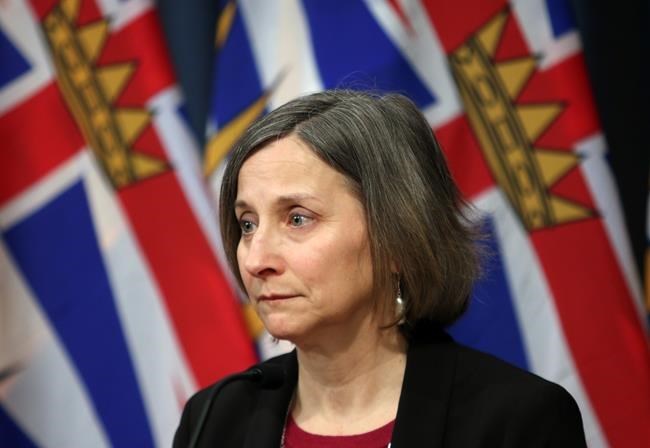
Chief coroner Lisa Lapointe looks on during a press conference at the legislature in Victoria on Thursday, Feb. 7, 2019. THE CANADIAN PRESS/Chad Hipolito
Republished September 29, 2021 - 2:18 PM
Original Publication Date September 29, 2021 - 8:16 AM
VICTORIA - A new report from British Columbia's coroner says suspected illicit drug toxicity deaths in July were the second highest the province ever recorded in a single month.
The findings released Wednesday show deaths reached 184 in July, which tied with those in January and fell just behind June 2020 when 186 people died.
The report comes less than a month after chief coroner Lisa Lapointe said January to June was the deadliest period ever for drug toxicity in B.C.
With data from July added, the report says the 1,204 suspected illicit drug toxicity deaths are the highest ever in the first seven months of a year and 28 per cent above the same period last year.
Lapointe said an average of six people died every day in July.
Men accounted for nearly 80 per cent of the total fatalities, while 72 per cent of those who died were between the ages of 30 and 59.
Deaths involving fentanyl stayed at 86 per cent, unchanged from 2020, but the report says fatalities linked with extreme fentanyl concentrations jumped to 13 per cent from eight per cent.
The ultrapowerful opioid carfentanil was detected in 113 deaths this year, compared with 65 over the same period last year.
The July figures are "a stark reminder of the tragic and unrelenting trajectory of this public health emergency," Lapointe said in a news release.
"We know that the loss of each of these individuals leaves a devastated circle of family and friends who are grieving the preventable death of a cherished loved one."
July marks the 17th consecutive month in which more than 100 residents in B.C. died from the toxic drug supply, the coroner said.
A public health emergency was declared in 2016 and since then the overdose death rate has almost doubled from 20.4 per 100,000 people to 39.7 per 100,000 in 2021.
Sheila Malcolmson, the minister of mental health and addictions, said in a statement the government has been adding services and supports in an unprecedented way, but B.C. is facing a rising tide of need.
"The big changes we're working on will save many lives in the longer term. This includes more and varied services that address the root causes of addiction, decriminalization to stop the stigma against people who use drugs and a prescribed safer supply to separate people from poisoned street drugs."
The Centre for Addiction and Mental Health issued a statement Wednesday on decriminalization of substance use, echoing long-standing calls to the federal government from advocacy groups, health officials and some politicians.
It says making criminals out of substance users has been ineffective and counterproductive.
The federal government needs to ensure that decriminalization applies across the country, that treatment and harm-reduction services are increased and the toxic drug supply is replaced with pharmaceutical alternatives, the centre says.
The coroner's report said Vancouver Coastal Health and Northern Health have the highest rates of drug toxicity deaths, with 47 and 46 deaths respectively per 100,000 population.
Communities with the highest rates include Merritt, Powell River, Enderby, Peace River South and Hope, it says.
Most overdoses in 2021 have been indoors, in private homes, while data shows 15 per cent have happened outside in vehicles, parks, sidewalks or streets.
No deaths have been reported at supervised consumption or drug overdose prevention sites, the report says.
This report by The Canadian Press was first published Sept. 29, 2021.
News from © The Canadian Press, 2021